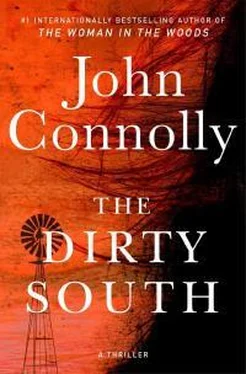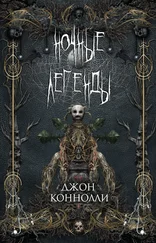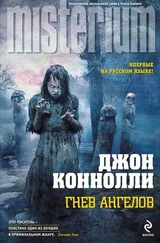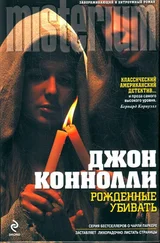‘Eddy got careless and left a paper trail,’ said Griffin. ‘Then his friends began to desert him, or just upped and died. Same for any allies he might have cultivated in Little Rock, so he couldn’t rely on the attorney general’s office to give him a pass, especially once Jim Guy Tucker became governor in late ninety-two. By then Pappy Cade was already laying the foundations for outside investment in Burdon County, with the active support of Little Rock, and nobody needed Eddy Rauls arriving with his hand out and an empty grocery bag for the cash. So Eddy received a quiet ultimatum: leave with a pension or be indicted. Naturally, he chose the pension, and he’s been nursing a grudge against the Cades ever since.’
Parker added Eddy Rauls to his list of names.
‘Anyone else I should know about,’ he asked, ‘while we’re on the subject of people holding grudges?’
‘If you mean against the Cades, that’s a complex issue. Ferdy Bowers has no love for them, and he’s had his nose bloodied by Pappy in business dealings over the years, but he stands to gain from Kovas, if not as much as Pappy and his brood. That disparity remains a source of resentment for him, but the lure of enrichment keeps a civil tongue in his head. And then there’s Randall Butcher.’
‘Who’s Randall Butcher?’ said Parker.
‘You asked me earlier if I knew who Tilon Ward might be cooking for. I’m not alone in feeling that it might be Butcher. He owns a chain of strip clubs across the state, and is currently appealing a decision by a Burdon County judge denying his application for a five-thousand-square-foot building off Linseer Road, just inside the Cargill town limits. Butcher wants to develop it as the jewel in his empire of the flesh. The site is zoned C-3 Commercial, which means that no sexually oriented business can open within seven hundred and fifty feet of a school, church, or residential neighborhood. Butcher is arguing that the church in this case is disused, and two houses don’t constitute a neighborhood. He wants his club up and running before work starts on any Kovas facility, so he can reap the benefits of horny construction workers with money burning holes in their pockets.’
‘And how do the Cades feel about this?’
‘The Cades are among those opposing the application, mainly because they don’t own the site – Butcher acquired that land behind their backs – and also because they might be hoping to invest in a similar, marginally classier establishment down the line. So Butcher is trying to drum up local support to persuade the Alcoholic Beverage Control Division to review his application, and the Cades are doing their best to discourage all concerned.
‘Just to complicate matters further, the disused church, and the land on which it stands, was donated about a year ago to the Cargill African Methodist Episcopal congregation. Their current house of worship is already too small for their needs, but if the population expands, they’ll have to look elsewhere, and that old church would be perfect, assuming they can raise the funds for repairs. If they do decide to relocate, Randall Butcher’s strip club will be dead in the water. Last I heard, he was trying to convince Reverend Pettle to sell the property in return for another site. Trouble is, Randall doesn’t have another site to offer right now, because everyone that owns property is sitting on it in the hopes the Kovas deal will produce a windfall. Plus, the majority of development land is in the hands of the Cades.’
‘It sounds like the Cades have bet everything on Kovas,’ said Parker, ‘and other people are following their lead. If it goes bad, the family will have made a lot of enemies.’
Griffin glanced at him.
‘You think these killings might be a way of getting at the Cades by sabotaging Kovas?’ he asked.
‘It’s possible,’ said Parker, ‘assuming you’re right, and Patricia Hartley’s body was originally left on federal land in order to draw in the FBI. But why not do the same with Donna Lee Kernigan, and how does it all connect back to Estella Jackson, who died long before Kovas even appeared on the radar? Also, it seems to me that most people in Burdon County, including the Cades’ rivals, will benefit from Kovas, so blowing up the deal in order to hurt the Cades would involve a suicidal degree of self-harm.’
He paused for a moment.
‘And killing is hard,’ he said, finally.
Griffin didn’t comment. He had never killed anyone, and intended for that situation to endure until he was laid in his grave. He didn’t doubt the truth of Parker’s words, but retained some hope that, whatever the rumors about Johnny Friday, the assertion was not based on Parker’s personal experience.
‘What was done to those young women involved planning, and viciousness,’ Parker continued. ‘It wasn’t enough just to take their lives: they had to be violated after death, and their bodies displayed.’
‘Meaning?’
‘It shows real hate, and that hate is growing stronger.’
They were nearing the outskirts of Hamill, the county seat, even though it was smaller than Cargill. Nevertheless, Hamill resembled the latter, right down to the crumbling strip mall on the edge of town. It was as though the two men had come full circle and arrived back at their point of origin. Parker had the uncomfortable sense that he might never be permitted to leave Cargill, and had somehow wandered into a hell of another’s making.
Griffin turned off the main road. They drove for another mile, until they came to a lane on the right signposted PRIVATE. Griffin turned again, and followed a trail marked by stunted trees to a cluster of four dwellings, three of them new and one, the largest, of older vintage. Made of dark wood and darker stone, it spread over three floors, the boundary marked by a low wall that circled the property. Four cars were parked in the driveway, one of them a Burdon County sheriff’s cruiser.
‘The big house is Pappy’s,’ said Griffin. ‘The others theoretically belong to each of the kids, although Delphia now spends most of her time in Little Rock, and Jurel has a place of his own in town.’
‘Nothing like a close-knit family,’ said Parker.
‘True,’ said Griffin, as they came to a halt. ‘And the Cades are nothing like a close-knit family.’
38
Any number of people might have been on the list of those who Tilon Ward didn’t wish to see waiting at his mother’s property when he returned from driving around Cargill and its surrounds, half hoping to catch a glimpse of Sallie Kernigan or her vehicle, and all the time thinking about Donna Lee. High on that list would certainly have been Pruitt Dix, and not just because, even in repose, Dix possessed the demeanor of a man who got off on smothering infants. His malignant singularity made him also a fixture, if only in the abstract, on the lists even of those who had yet to encounter him, like a nightmare waiting to be lent flesh.
Dix was Randall Butcher’s enforcer. Butcher maintained two faces. The first he displayed to the organs of federal and state government, including the Arkansas Alcoholic Beverage Control Division, the IRS, and anyone in possession of a badge. When Butcher wore that identity, he accessorized it with a suit and tie, and the genus of Little Rock lawyer that didn’t need to advertise on highway billboards.
Randall Butcher’s other face, the one with which Tilon was more familiar, was very different, typically complemented by jeans, a check shirt, the threat of violence, and the instrument of that violence in the guise of Pruitt Dix. But Dix rarely made house calls, and when he did, it was usually with an eye to ensuring that someone’s health took a turn for the worse. Dix wasn’t a big man, but God had packed a lot of meanness into that small space. Dix kept his head and face completely shaved, his dark eyebrows excepted, wore no earrings, and eschewed tattoos or other markings. Neither did he smoke or drink. His only vice was hurting people, and since this was how he made his living, it had assumed the status of a virtue.
Читать дальше












